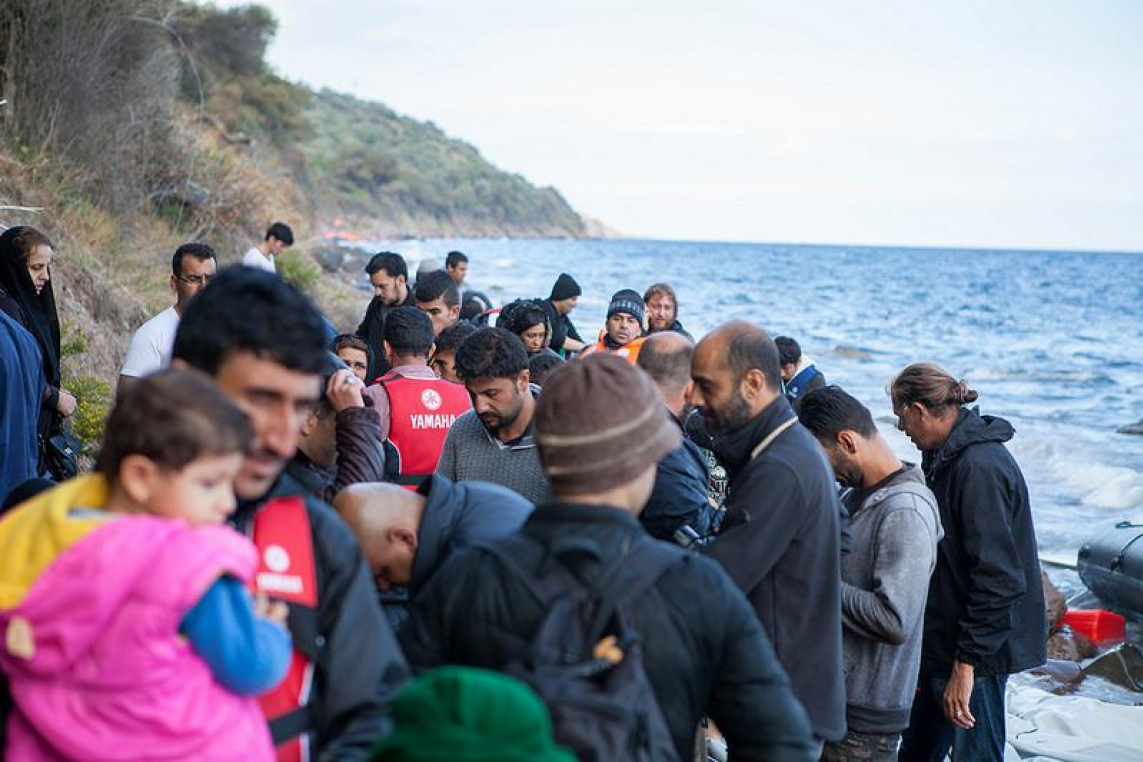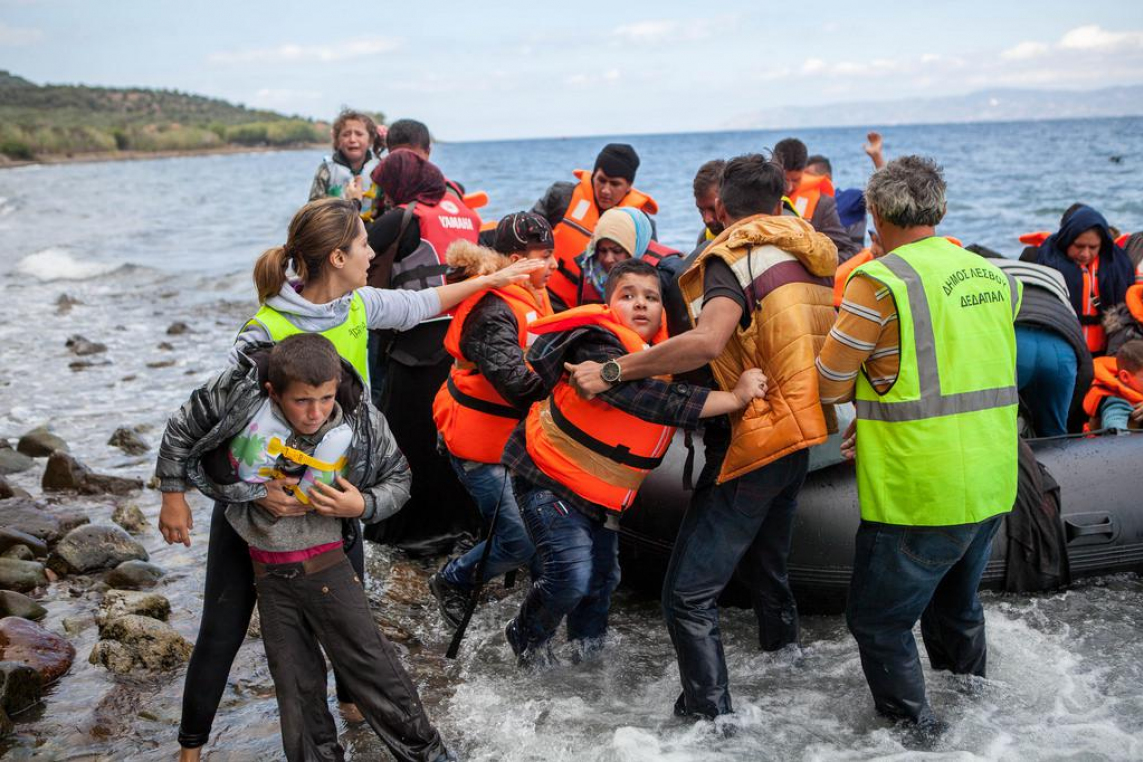The impact of “the refugee crisis”: rights are at risk in Europe
From summer 2015 until spring of 2016, an increase in the number of people arriving in Europe to seek international protection stimulated a profound political crisis. Although it was termed “the refugee crisis”, it is more properly called a crisis of policy-making, a crisis of the EU, a crisis of European identity or even a crisis of humanity, as a refugee participant suggested in the recent Civil Society Forum organised by Vluchtelingenwerk Vlaanderen. It was not refugees who caused the crisis or who were at fault.

Ben White/ CAFOD (CC BY-NC-ND 2.0)
From summer 2015 until spring of 2016, an increase in the number of people arriving in Europe to seek international protection stimulated a profound political crisis. Although it was termed “the refugee crisis”, it is more properly called a crisis of policy-making, a crisis of the EU, a crisis of European identity or even a crisis of humanity, as a refugee participant suggested in the recent Civil Society Forum organised by Vluchtelingenwerk Vlaanderen. It was not refugees who caused the crisis or who were at fault.
There was a quadrupling of the number of people arriving in Europe in 2015 compared to 2014. Accordingly to Frontex, the EU’s border agency, there were approximately 1.5 million “illegal” entries of persons into the EU and Schengen area in 2015. While the term “illegal” is used by Frontex the preferable term is irregular since it is not illegal under international law to cross a border in search of protection. They calculate that these entries involved around one million persons because many crossed two or more borders.
The numbers themselves do not explain why the situation became a crisis: Europe, the world’s richest continent with a population of over 700 million people, could have managed. It is also a continent that is for the most part at peace, relatively diverse, and with a strong tradition of human rights protection. Not only that, due to demographic changes within Europe, it would actually benefit hugely from the absorption of new populations.
Stumbling Blocks
While Europe could and should have coped with the arrivals of people, a combination of factors prevented this. First, the fact that people were forced to arrive “spontaneously” or irregularly due to the lack of safe and legal channels, provoked a sense of fear, as has always been the case historically for “spontaneous arrivals” of forcibly displaced persons.
Second, the lack of solidarity within Europe meant that the response was not collective, as countries refused to assist each other and work together. Finally, the legal order that people arrived into was the already dysfunctional Common European Asylum System. Within the CEAS, the Dublin Regulation means that the country of first arrival has responsibility for asylum claims, with a disproportionate responsibility thus falling on Italy and Greece.
In both countries, there are significant institutional flaws in the asylum system, combined with a disincentive to register people’s arrival and – with tragic consequences – a perverse incentive to keep standards so low in order to prevent people being sent back from other Member States, which becomes illegal when standards fall below EU law, for example when it comes to reception conditions for refugees. This led to the movement of refugees across Europe in an attempt to reach countries that did offer protection.
The majority of people arriving in Europe – currently and since 2015 – is entitled to international protection, either as refugees or in the form of subsidiary protection. This compares to the situation 15 years ago when only a small majority of asylum-seekers in Europe were granted protection status, and reflects the fact that up to two-thirds of those seeking protection in 2015 were Syrians (one-third were recorded as Syrian with one-third recorded as “nationality unknown” at point of entry, with many likely to be Syrians).
“Economic migrant” is increasingly used as a derogatory term to describe those not entitled to protection, but it is a complex category of people.
Refugee recognition rates (i.e. the percentage of applicants granted protection) are at over 98% for Syrians arriving in Europe, although there is one outlier: Hungary. In 2016, the recognition rate for Syrians in Hungary was 8% and has fallen below 4% in the first quarter of 2017. In other words, currently only 4% of the Syrians applying for asylum in Hungary are recognised as refugees and are granted protection. After Syria, the two main countries of origin of asylum-seekers in 2015 were Afghanistan and Iraq, which remained the case in 2016.
There are of course migrants who come to Europe for other reasons – lack of jobs and opportunities, poverty, climate degradation, corruption, despair, opportunism etc. “Economic migrant” is increasingly used as a derogatory term to describe those not entitled to protection, but it is a complex category of people.
Human Rights
As human beings, all of those arriving in Europe, regardless of status, have human rights. But what does this mean in practice? Hannah Arendt said that the only thing more dangerous than being a Jew was being a human, meaning that benefiting from universal human rights, by virtue of being human, in reality can offer scant protection.
Benefiting from universal human rights, by virtue of being human, in reality can offer scant protection.
Rights are only meaningful if there is a concomitant responsibility, not in the sense of the responsibility of the rights-bearer to behave in a particular way but rather the responsibility of someone or some institution to guarantee the rights. Thus, people have to be able to access their rights and it has to be possible to enforce those rights against a state or other responsible party. Indeed, most human rights work focuses on access and enforcement.
For migrants on the move during the crisis, they had rights under international human rights law, international refugee law, the European Convention and EU law but accessing and enforcing rights remains a problem. Rights theory argues that the “level of attachment” determines the rights that a person has: as they move through different steps, their rights increase, from being under a state’s jurisdiction, to physical presence, to lawful presence, to lawful stay and finally to durable residence. At each point more rights are acquired.
During the crisis and in response to it, European states have tried to limit access to rights within Europe, by preventing people from moving through these different levels. Being under a state’s jurisdiction grants the right to make an asylum claim, to request international protection, and the right to non-refoulement - not to be returned to a place where they are not safe. We have seen increased use of strategies to avoid assuming jurisdiction.
Rights on the slope
The crisis affected rights – of refugees, migrants and others – in the following ways. First, the crisis modus operandi itself puts rights at risk. It was used to justify the adoption of policies and legal measures so rapidly that adequate scrutiny was not possible. Second, the response of the EU in spring of 2016 involved a set of legislative proposals for reform of the Common European Asylum System, which contains multiple restrictive measures, including an admissibility procedure at point of arrival which will limit the right to asylum, restrictions on free movement with a punitive approach to “secondary movements” from one EU country to another, restrictions on duration of residence, mandatory annual review of status and so on.
Human rights organisations have analysed the proposals and strongly advocate for removal of elements that limit refugee rights in Europe. However, at national level, restrictions on rights have already been put in place, with the most common involving limiting the right to family reunification and reduction of assistance. In some Member States, far harsher measures have been adopted, notably in Hungary, where the new asylum law involves automatic detention of asylum seekers and refugees and has led the European Commission to begin an infringement procedure.

Ben White/ CAFOD (CC BY-NC-ND 2.0)
Third, in some strands of the political debate there is support for offering protection to refugees but a harsh approach to other migrants, who face increasing stigmatization. The distinction between the deserving (“genuine” refugees) and the undeserving (“economic migrants”) is used frequently. There are also increasing numbers of people who are classified in the undeserving category, for instance through changing approaches to assessing claims and a tendency to refuse claims despite a lack of change in objective circumstances.
Finally, there has been an increase in the use of return – forced deportation – for persons not recognized as refugees, often requiring the use of detention beforehand. All these trends are particular noticeable with regard to Afghans arriving in Europe. Stigmatization is particularly acute when it comes to Africans arriving via the South Mediterranean route.
The restriction in rights is accompanied by an attempt to avoid responsibility on the part of many states.
The restriction in rights is accompanied by an attempt to avoid responsibility on the part of many states, described as a race to the bottom with countries reducing rights due to unfounded fears about pull factors. Second, the legislative proposals on the table do nothing to change the Dublin system which is based on deflecting responsibility to countries of arrival. Most worryingly, a new strategy is emerging which centres on outsourcing protection responsibilities to other regions.
During the crisis, there was no evident strategy in response to the situation. There was a sense of panic, and decision-making was ad hoc and generally taking place outside EU frameworks, with unilateral, bilateral and “mini-lateral” actions prevailing. Now it is possible to discern an emerging strategy – unfortunately based on limiting access to protection in Europe. It has three elements: internal policies that are more restrictive with fewer rights provided to refugees and asylum-seekers in Europe; border policies that block entry through inadmissibility procedures, physical barriers, and reducing search and rescue (in order to avoid assuming jurisdiction); and external policies that support or force other countries to take on protection through making migration control a central objective of international cooperation, including under development and trade policies.
Welcome Regugees
In conclusion, rights are at risk in Europe and this may have a knock-on effect on the global protection regime as a whole and on rights provision in other regions. On the other hand, there has been a strong reaction across Europe in support of refugees and in defence of their rights. There has been a wave of generosity with welcome refugees movements and a huge increase in volunteers getting involved; refugee rights organisations are working hard and growing in number; refugees themselves are increasingly active as advocates; new actors, such as cities and regional governments, are stepping up to play a role; and professionals from lawyers to doctors to teachers work pro bono to support refugees. And despite everything, public opinion across Europe - with the exception of countries where governments have become extremist - remains supportive of offering refugees protection and of Europe guaranteeing their rights.
 Catherine Woollard is secretary-general at the European Council for Refugees and Exiles (ECRE)
Catherine Woollard is secretary-general at the European Council for Refugees and Exiles (ECRE)
This contribution is also included in the digital book Radical for Rights, published on the occasion of the “European Forum on Rights and Freedoms in times of increasing polarization”.
Maak MO* mee mogelijk.
Word proMO* net als 2793 andere lezers en maak MO* mee mogelijk. Zo blijven al onze verhalen gratis online beschikbaar voor iédereen.
Meer verhalen
-
Report
-
Report
-
Report
-
Interview
-
Analysis
-
Report









 Oxfam België
Oxfam België Handicap International
Handicap International